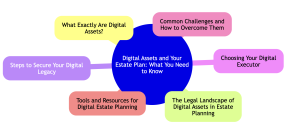
How to Settle an Estate in Montana
April 3, 2024
Senior Citizens and Disability Rights: What to Know
April 3, 2024In today’s digital age, your online life can be as significant as your physical one – especially when it comes to digital assets.
Digital assets, including everything from social media accounts to cryptocurrencies, play a role in estate planning. They hold both sentimental and financial value and need thoughtful management and inclusion in your estate plans.
Key Takeaways
- Digital assets in estate planning can be important.
- Identify diverse types of digital assets.
- Implement steps to manage digital assets securely.
- Appoint a digital executor for effective asset management.
- Understand legal frameworks to ensure compliance.

What Exactly Are Digital Assets?
Digital assets include a wide range of online accounts and files with personal or financial value.
This definition extends to social media profiles, email accounts, digital currencies, online banking accounts, and digital collections such as photos or music.
- Social media profiles (Facebook, Instagram, Twitter)
- Email accounts
- Digital currencies (Bitcoin, Ethereum)
- Online banking and investment accounts
- Digital photo and music libraries
- Personal and work-related documents stored in the cloud
- Websites and blogs you manage
The Legal Landscape of Digital Assets in Estate Planning
What are the current legal standards governing digital assets in estate planning?
The legal landscape around digital assets in estate planning is evolving, with various laws and regulations beginning to address these modern concerns. Understanding these legal frameworks is needed for effective estate planning.
- The Revised Uniform Fiduciary Access to Digital Assets Act (RUFADAA) provides fiduciaries with the authority to manage digital assets during incapacity or after death, subject to certain limitations.
- State laws vary significantly, making it essential to consider jurisdictional differences when planning.
- Many digital platforms have ‘terms of service’ agreements that impact how your digital assets can be handled. It’s important to review these terms as part of your estate planning process.
Steps to Secure Your Digital Assets
How can you secure your digital assets effectively?
A comprehensive digital estate plan manages your digital assets according to your wishes.
Here’s how to start:
- Inventory digital assets. Compile a list of all your digital assets, including accounts, passwords, and digital files.
- Decide on asset distribution. Determine how you want each asset to be handled and who will inherit them.
- Select a digital executor. Choose a trusted individual to execute your digital estate plan.
- Legalize your digital estate plan. Incorporate your digital estate plan into your legal will or trust with the help of a legal professional.
Digital Assets: Choosing Your Digital Executor
When choosing a digital executor, consider someone tech-savvy and trustworthy, capable of handling your digital assets with care.
This role involves managing online accounts and distributing digital assets according to your wishes.
The ideal candidate is detail-oriented, respects privacy, and understands the digital landscape extensively. They should be able to navigate various online platforms and understand the legal aspects of digital asset management.
Digital Assets: Common Challenges and How to Overcome Them
Access vs. Ownership
To make directives for managing access vs. ownership of digital assets more actionable, first, itemize all digital assets, specifying which are transferable and which merely allow access. (1)
For each asset, create a document detailing instructions for your digital executor, including login information and how each asset should be handled after your death.
Use legal tools, like a digital will or estate plan, to formalize these instructions, ensuring they align with each platform’s terms of service and state laws on digital asset inheritance.
Privacy and Security
Implement strong security measures, such as encryption and secure storage for sensitive information. Educate your digital executor on maintaining these standards to protect your digital legacy.
Compliance with Platform Policies
Read the terms of service for each digital platform and include instructions that align with these policies. This may involve using platform-specific tools for legacy management or account deletion.
Tools and Resources for Digital Assets in Estate Planning
For tools and resources to aid in digital estate planning, consider leveraging a combination of password managers, online will-making services, and digital estate planning software.
Password managers like LastPass or 1Password can securely store access information, while platforms like Everplans and Trust & Will offer structured ways to create and manage digital estate plans.
Additionally, consult legal software designed for estate planning professionals who have more comprehensive needs.
Wrapping Up – Your Trusted Elder Law Attorneys for Digital Assets
Understanding the significance of including digital assets in your estate planning cannot be overstated.
These assets form part of your legacy and require careful management to ensure they are handled according to your wishes.
You can create a robust digital estate plan by taking proactive steps like inventorying digital assets, appointing a digital executor, and utilizing available tools and resources.
For those seeking expert guidance, Montana Elder Law offers specialized knowledge in digital assets. They make sure your digital legacy is preserved and protected with the same diligence as your physical assets.
Their expertise makes them a go-to resource for anyone managing digital estate planning. Call or visit us online today!
References:
(1) Fidelity, Estate planning for the digital era, https://www.fidelity.com/viewpoints/wealth-management/estate-planning-for-digital-assets

